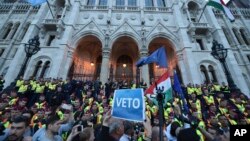Lawmakers from Hungarian Prime Minister Viktor Orban's right-wing Fidesz party approved draft legislation Tuesday that critics say could force the closure of an international university founded by billionaire philanthropist George Soros.
The legislative approval sparked protests by thousands of critics outside the campus of the Budapest-based Central European University, CEU — an English language institution of about 1,400 students from more than 100 countries. Thousands of university supporters also took to the streets of Budapest Sunday.
The bill requires 28 foreign universities operating in Hungary to have campuses in their home countries as well. CEU, founded after the 1991 fall of the Soviet Union, is the only international college with no overseas branch. The bill further requires Washington and Budapest to find agreement on university operations within months.
Without a deal, the bill would ban the university from enrolling new students after January 1, 2018, and force it to close in 2021.
A top diplomat at the U.S. embassy in Budapest voiced support for the university and disappointment with the legislation.
"The United States is disappointed by the accelerated passage of legislation targeting Central European University," said embassy Charge d' Affaires David Kostelancik. "The United States will continue to advocate for [CEU's] independence and unhindered operation Hungary."
Orban viewed harshly in West
Orban, viewed in much of Europe and beyond as an autocrat and xenophobe, has long considered liberal Soros an ideological foe. He is an outspoken critic of European Union migration policy, and has loudly criticized European sanctions against Russia that were imposed after Moscow's 2014 annexation of Ukraine's Crimea peninsula.
The online U.S. publication Politico described him in 2015 as "Europe's New Dictator."
Last October, demonstrators marched in Budapest to protest the sudden closure of the country's largest selling opposition newspaper, Nepszabadsag.
Those protests also targeted Orban, who has long been accused of stifling press freedoms and isolating private media outlets critical of his controversial anti-migrant stance on refugees.
The newspaper's shutdown came just weeks after it published reports alleging widespread corruption within Orban's ruling party, including close allies of the prime minister.





